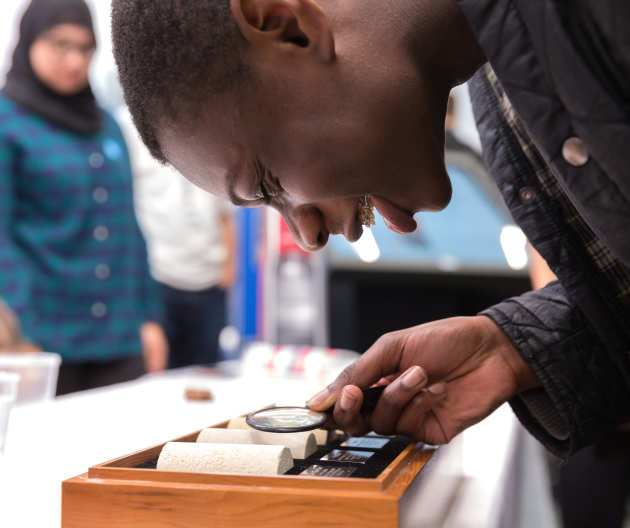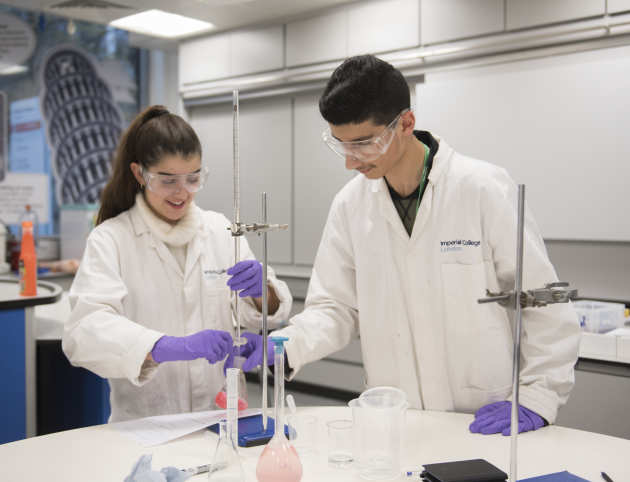This is applicable to:
- Line Managers/supervisors of Young Persons
- HODs/PIs accepting a Work Experience Student in their area
- any member of staff wishing to bring a child into College Buildings for any reason
NB: Note that although Young People and Work Experience Students are accepted into many areas of the College, there are limitations in some teams or departments. If there is reason for doubt, please seek permission from the HOD before proceeding with the placement.
Definitions
- a Young Person is someone aged between 16 and 18, whether or not in full time education
- a Work Experience Student is aged between 14 and 16 (i.e. in year 10 or 11 at school) and undertaking a course of full-time education
- a child is aged under 14
Young person as employee
- The College does not let young people under 18 years old undertake work which cannot be adapted to meet any physical or mental limitations they may have, i.e. jobs that require repetitive or forceful movements; dealing with violent and aggressive behaviour and decision making in stressful situations; work with complicated and intrinsically hazardous equipment (machine tools etc.) where control measures require physical and phschological maturity.
- Without exception Young People must not: work with radiochemical substances; work with carcinogenic/mutagenic substances; handle (including carrying closed bottles) hydrofluoric acid, chromic acid or other strong acids and alkalis; work with Category 2, 3, or 4 biohazards; work with bio or clinical waste; work at heights above 2 metres, work outside normal operational hour.
- A risk assessment must be undertaken of all situations, including offices, where young people are employed or are about to be employed. This must be completed before they arrive, taking particular account of risks to the young people. The risk assessment must take account of all hazards and risks; consideration must also be given to the psychological and physiological characteristics of the young person. (See Factors for consideration for Risk Assessment)
- PIs/Supervisors must ensure that any risk is reduced to the lowest level that is reasonably practicable. Where risk assessment identifies a significant residual risk that cannot be eliminated, then the Young Person must be prohibited from undertaking that work.
- Young Persons must receive a health and safety induction on the morning of their first day
- All young people should be supervised at all times by a competent person. There should be no lone working.
- Working hours should be limited to no more than seven hours a day and they should take numerous rest breaks and one hour lunch break.
Student on a Work Experience Placement

In addition to the requirements for Young Persons as an Employee the Department must provide information to the parent or legal guardian on the risks identified in the Children and Young Person Risk Assessment, associated control measures and the provision of information necessary for training, and the supervision provided, before the Young Person starts work. For Guidance for managers when offering a work experience placement, please visit the HR Work experience site.
Generic Risk Assessment Template
Children and Young Person Risk Assessment
Work experience students:
- Must receive safety training especially in emergency actions on starting their work experience
- should only undertake scientific work in the laboratories assessed as low risk under strict supervision,
- may observe other activities under strict supervision.
- Supervisors must ensure that the Work Experience Student is not left alone in laboratory areas or behind secured doors at any time
- The College must be satisfied that safe travel arrangements to and from work are in place.
Young Persons Undertaking Short Term or Vacation Work
- If the Young Person is not engaged in a course of full-time or part-time study then the instructions are those for “Young Person as Employee”.
- If the Young Person is engaged in a course of full-time or part-time study then the instructions are those for “Work Experience Student”.
Young Persons and Work Experience Students, Visiting but not working
- A risk assessment must be carried out when visits by parties of Young Persons and Work Experience Students for educational purposes are being planned.
- Young Persons and Work Experience Students visiting the College must be accompanied by the parent, guardian, teacher or sponsor at all times.
Children
- No child may be brought into College Buildings without the prior agreement of the HOD/Faculty.
- No child may be taken into any working laboratory areas unless as part of a pre-arranged event such as an open day.
Factors for Consideration for Risk Assessment
Psychological factors
- The assessment should take into account the inexperience and level of maturity of the young person and also their possible lack of awareness of existing or potential risks. There may be situations where these factors are of sufficient importance that the young persons should be prohibited from the work.
- In other cases provision of additional supervision and information may be necessary. Consideration should be given to limited concentration and learning limits in young persons
- The Risk Assessment should identify an independent contact within the Department, along with their contact details, so that the young person can go to them if they feel unsafe for any reason. In the absence of someone related to the placement, you should contact Human Resources, who can provide advice and guidance on this issue.
Physiological factors
- Particular physiological factors which should be considered in relation to the level of maturity of young persons include:
- availability of PPE which is suitable for young persons (e.g. appropriate fit);
- stature, strength and reach of young persons in relation to their ability to operate controls (this is likely to be particularly relevant to the operation of vehicles and power tools); and
- body dimensions of young persons in relation to safe distances used to prevent access to hazardous areas.
- Particular emphasis should be placed on identifying all chemical, biological, electrical, ergonomic and manual handling hazards and how the processes will be conducted.
- Consideration must also be given to introducing indicative exposure limits for noise, hand-arm vibration, repetitive actions and sub-ambient temperatures.
It is not permitted for children or young persons to be taken into College or Trust Partners' animal facilities.
Useful links:
 Imperial College Child Protection and Safeguarding Policy
Imperial College Child Protection and Safeguarding Policy
HSE guidance for employers
Management of Health and safety at Work Regulations 1999
Guidance Note: Safety of Children and Young Persons on College Premises
